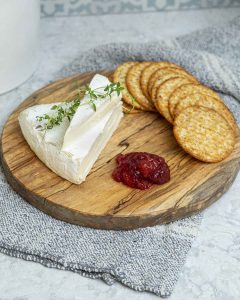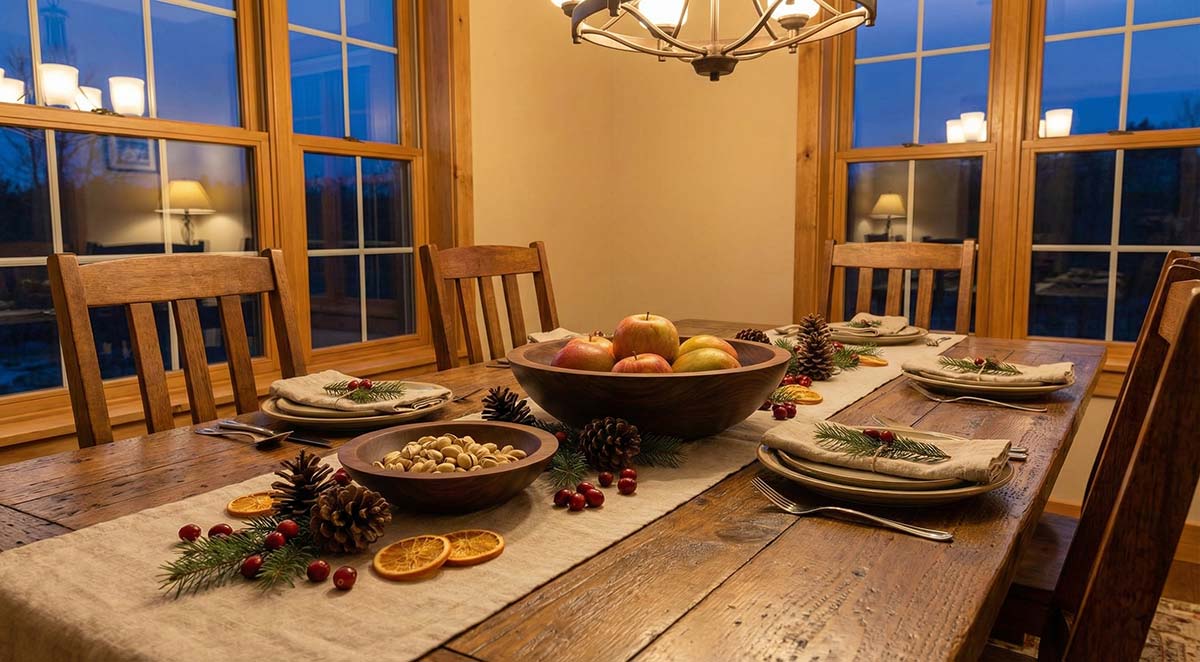A farm-to-table dinner party is a great way to bring gourmet dining into your home. It’s not just about the food (though that part is delicious!). It’s also about creating and sharing a meaningful experience that reflects your values. Autumn, with its abundant harvest, is the perfect time to host a dinner party featuring a locally sourced meal. And with Spencer Peterman’s handcrafted wooden boards and bowls, you can set a sustainable and stylish table for your guests.
Here’s how to host a farm-to-table dinner party that is both eco-friendly and memorable.
Choose Fresh, Local Farm-to-Table Ingredients

A farm-to-table dinner party begins with fresh, seasonal ingredients from local farms or your own garden.
For a fall dinner party, consider these ingredients:
- Artisan cheeses from nearby farms.
- Cured meats like prosciutto or salami.
- Root vegetables such as carrots and beets.
- Fresh herbs like rosemary and thyme.
If, like us, you’re located in Western Massachusetts, check out some of our favorite farms and shops when sourcing local ingredients for your dinner party:
- Sutter Meats in Northampton, MA: Sutter works directly with area farms to provide locally, sustainably sourced meats, including fresh cuts, sausages, and charcuterie.
- Atlas Farm in South Deerfield, MA: Atlas Farm is a certified organic, diversified family owned farm. Their farm store is open year round and conveniently carries farm products from Atlas and beyond!
- Cricket Creek Farm in Williamstown, MA: Cricket Creek is a grass-based dairy in the Berkshires. Find their cheese at their farm store or locations throughout the Pioneer Valley.
And of course, don’t forget Western Massachusetts’ wide array of wonderful farmers’ markets. Many are open well into the fall.
Live outside of Western MA? Not to worry, Local Harvest is a directory that can connect you with small farms in your area.
A Touch of Rustic: Wooden Kitchenware

The right presentation elevates any meal. Our wooden bowls and boards, made from locally and sustainably sourced wood, are both eco-friendly and visually striking. Each piece is handcrafted and features natural grain patterns that make them one-of-a-kind.
What sets us apart is not just our commitment to sustainability, but the use of rare and unique wood types. Burl wood, spalted maple, and ambrosia maple are just a few examples. These woods have incredible textures and color variations that are only possible through natural processes. Each bowl showcases the wood’s journey, giving you a stunning piece of nature that’s full of character.
Whether you’re serving a salad or bread, these boards add a rustic charm to your table. Their live edges and unique shapes will make your meal even more special. Plus, the sustainability story behind each bowl adds a thoughtful touch.
Create a Stunning Charcuterie Board

No farm-to-table dinner party is complete without a charcuterie board. Our boards, with their natural textures, are perfect for displaying artisanal cheeses and cured meats.
Follow these tips to create a charcuterie board that will impress at any farm-to-table dinner party:
Select a range of cheeses: Choose soft, semi-hard, and aged cheeses. A local goat cheese or blue cheese works beautifully.
Add cured meats: Thinly sliced prosciutto, salami, and chorizo are great choices.
Incorporate seasonal fruits: Pears, apples, and figs add sweetness and color to your spread.
Don’t forget the extras: Small bowls of olives, honey, or nuts complete the board.
Pair your charcuterie with a selection of local wines or craft beers to round out the farm-to-table experience.
For more tips, check out our charcuterie guide.
Make Your Farm-to-Table Dinner Party Sustainable

While a farm-to-table dinner party focuses on fresh, local food, it’s also about sustainability.
Here are some tips to reduce your environmental impact:
Use reusable napkins and glassware: Avoid disposable options by choosing fabric napkins and real glasses. This enhances the elegance of your dinner while reducing waste.
Plan your portions carefully: Serve just the right amount to minimize food waste. Any leftovers can be used in creative post-party meals.
Compost food scraps: Vegetable peelings, eggshells, and other scraps can be composted to reduce landfill waste.
For more sustainable entertaining tips, check out our recent guide to throwing a zero-waste dinner party.
Happy Hosting!
Hosting a farm-to-table dinner party is about more than just delicious food. It’s an experience that reflects your values of sustainability and quality. Spencer Peterman’s wooden boards and bowls help you create a beautiful, eco-friendly table that your guests will remember. Each piece tells a story of craftsmanship and care, making your gathering even more meaningful.


